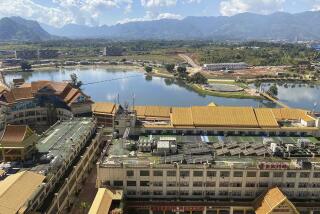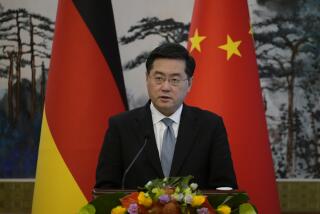China-Vietnam Agreement on Cambodia Told
- Share via
BEIJING — China and Vietnam have agreed that Vietnam will withdraw its troops from Cambodia by September and China will end its aid to resistance forces there, Australian Foreign Minister Gareth Evans said here Monday.
After meeting for four hours with Chinese Foreign Minister Qian Qichen, Evans told reporters that the arrangement between the main backers of the opposing sides in the Cambodian conflict appears to be “watertight.”
The agreement apparently was reached during a mid-January visit to Beijing by Vice Foreign Minister Dinh Nho Liem of Vietnam.
Evans said Qian told him that China will end its aid to the resistance forces by September in return for the promised Vietnamese withdrawal. It is possible, he said, that the cutoff of Chinese aid will begin before September and be phased according to the pace of the Vietnamese pullout. Vietnam is estimated to have 100,000 troops in Cambodia.
China has been the main military backer of the three-faction resistance coalition fighting the Vietnamese-installed Phnom Penh government. The Khmer Rouge, which ruled Cambodia with a tyrannical and murderous regime from 1975 until Vietnamese troops drove it from power in late 1978, is the strongest of the three factions and has received the greatest share of the Chinese military aid.
Widespread international concern has focused in recent months on whether a Vietnamese pullout will lead to a return to power by the Khmer Rouge. The Khmer Rouge forces, estimated to number 40,000, are reported to have large quantities of weapons and ammunition stockpiled in the Cambodian jungle, but a cutoff of Chinese military aid would nonetheless be a major step toward limiting their chances of resuming dictatorial power.
Still, China continues to insist that the Khmer Rouge should be included in a four-party government of national reconciliation formed by the three resistance factions and the present government. China favors Prince Norodom Sihanouk, former ruler of Cambodia and head of one of the resistance factions, as the top leader of the new government.
“We maintain that along with Vietnam’s genuine and complete troop withdrawal from Cambodia, the four parties in Cambodia should reach national reconciliation and establish a provisional quadripartite coalition government of a transitional nature headed by Prince Norodom Sihanouk to organize a future general election and make proper arrangement for the troops of each party,” Chinese Foreign Ministry spokesman Li Zhaoxing said at a press conference last week.
Li repeated China’s longstanding position that no faction should be excluded from the government--and that no faction should be allowed to monopolize power.
“Only with a quadripartite coalition can civil war and turmoil be avoided,” Li said. “This is not only in the interests of the Cambodian people, but also in the interests of Vietnam, Thailand and other neighboring countries, and represents the universal aspiration of the international community.”
Evans, who conferred with officials in Hanoi earlier this month, said Monday that with the basic shape of a so-called external solution now decided, the focus of negotiations will shift to the search for an internal solution capable of reconciling the four Cambodian factions.
He said Qian told him that Cambodia will be a major topic of discussion when Soviet Foreign Minister Eduard A. Shevardnadze visits Beijing this week.
“There will be a lot of detailed discussions . . . about nuts and bolts (of a Cambodian settlement),” Evans said.
Li said at last week’s press conference that China feels “that all parties concerned should reach an agreement on the political settlement of the Cambodian issue first and then convene an international conference, so as to provide international guarantees for the implementation of the agreement and for the independence, neutrality and nonaligned status of Cambodia.”
Li said that China will be willing to participate, along with other countries, in an effort to provide such international guarantees.
Meanwhile, in Bangkok, Thailand, the leaders of the three resistance factions said Monday that they will attend talks scheduled for Feb. 19-21 in Jakarta, Indonesia, aimed at settling the conflict, Reuters news service reported.
More to Read
Sign up for Essential California
The most important California stories and recommendations in your inbox every morning.
You may occasionally receive promotional content from the Los Angeles Times.













